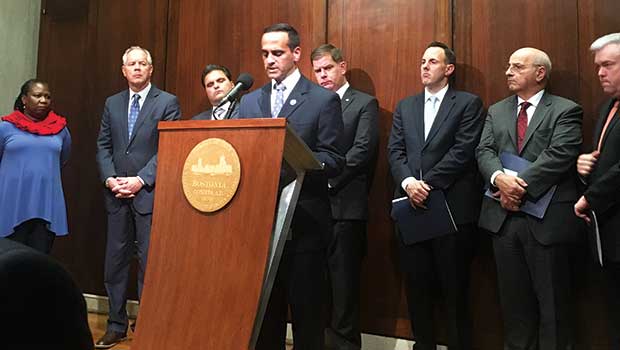Mayors push for affordable housing
Plan regional approach to meeting Greater Boston area housing needs

Mayors from across Greater Boston came together last week to announce a new partnership to tackle the issue of housing — a consistent concern for local residents — through a regional approach. The Metropolitan Mayors Coalition of Greater Boston, consisting of Mayor Martin Walsh and mayors of 14 surrounding cities and towns, said the new inter-city body would work over the next six months to identify key goals for the group and establish an overarching plan to increase the housing stock and address other major housing concerns.
“This is an incredible time in Boston’s history — the economy is thriving,” Walsh said, addressing reporters at City Hall. “More people are putting down roots and raising families here.”
It is because of such growth, he said, that a concerted approach to housing policy was needed — not just within city limits, but stretching across the entire metropolitan area where the population is increasing. He referenced the Greater Boston housing “report card” released last month by the Boston Foundation and Northeastern University, pointing to its call for a robust increase in the city’s housing supply in order to accommodate the influx of people moving to the region for work.
The announcement by the MMCGB follows in the footsteps of Boston’s citywide plan, Imagine Boston 2030, which was released in July after a two-year planning and public commentary period, and an earlier housing plan released in 2014 that set a goal of 53,000 new housing units by 2030— a goal Walsh said the city was on schedule to hit.
He also said that the region was finally starting to see some rent stabilization — an area of improvement that the regional mayors hope to continue through the partnership. The Boston Foundation report card found that while Boston metro rents did rise sharply in 2015, the region has started to see some rent stabilization more recently, in conjunction with an increase in housing construction. That same report also found that, in particular, rents in the innermost core of the Greater Boston region fell from 2016 to 2017 — not by much, but still, it was the first time that this has happened since at least 2009.
Preventing displacement
Nevertheless, for many Boston residents, particularly in working-class neighborhoods that are experiencing an uptick in large-scale developments, those changes in the average regional rent prices may not translate into tangible benefits in their particular area. And with local activist groups regularly sounding the alarm about economic displacement and racial equity in housing, such concerns remain tantamount.
Both Walsh and Mayor Joseph Curtatone of Somerville referred to these issues during the press conference. “We really want to give people an authentic choice to stay in the community that they love,” Curtatone said.
Walsh added that the new coalition would have a key commitment to “keeping communities diverse — so people who grew up in our communities can stay.” He called this goal “a center point in this plan.”
The mayors said the housing plan would aim to increase a variety of different types of development, including “workforce,” senior, affordable and transit-oriented housing, as well as help preserve the current stock of housing, such as owner-occupied buildings. They also noted other key goals for the coalition: reducing evictions, addressing regional homelessness, cracking down on discrimination against both renters and homebuyers, and tackling the issue of concentrated poverty.
Variety
Marc Draisen, executive director of the Metropolitan Area Planning Council, summed up the goal thusly: “We want enough housing of all types for all people at different price points they can afford.”
While the coalition consists of just Boston and 14 of its neighboring cities and towns, a representative of the Baker administration was also in attendance. “Massachusetts needs to deliver more housing, more quickly, and in more places,” Undersecretary for Housing and Community Development Chrystal Kornegay said in a statement. “By focusing on establishing a measurable regional housing goal, and building concrete strategies to deliver on that goal, this initiative will help advance a housing market that works for everyone — from innovation economy employees to the service sector workforce, and from young families to older adults.”


![Banner [Virtual] Art Gallery](https://baystatebanner.com/wp-content/uploads/2024/04/Cagen-Luse_Men-at-store-e1713991226112-150x150.jpg)



